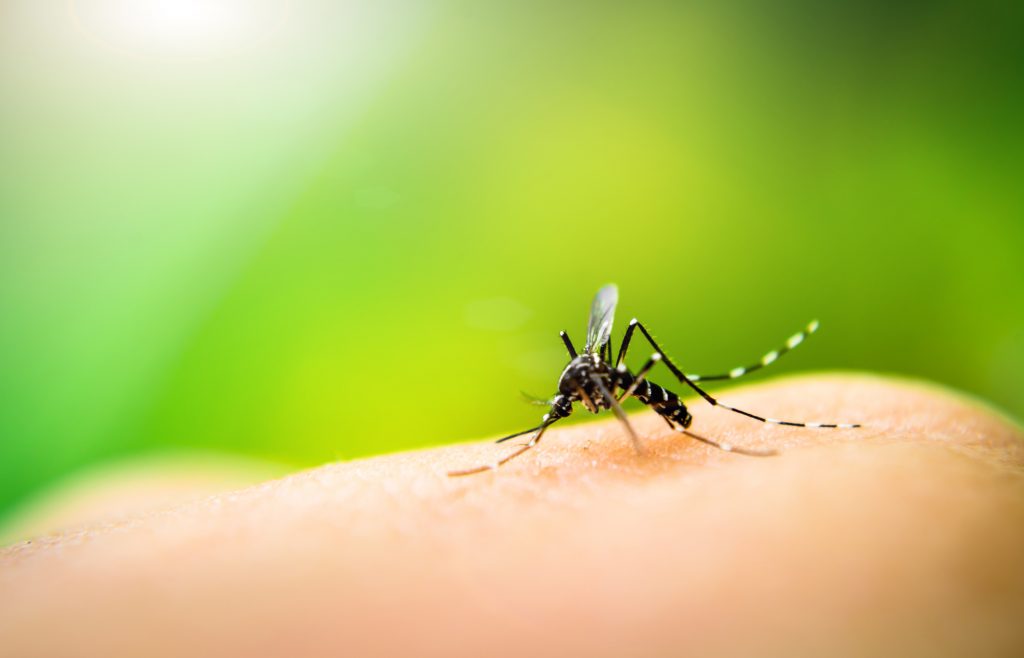
In some parts of the country, this has been called “the year of the mosquito.” Wet spring weather and other factors have made the bugs come out in droves this summer. And then there is the mass hysteria over cases of Zika, West Nile, and Lyme disease, which, at least according to conventional media, have all risen in number. Given these factors, it is tempting to reach for that bottle of DEET-containing insect repellent, especially when conventional institutions maintain that it is safe.
The U.S. Centers for Disease Control says that using an insect repellent containing DEET is the best course of action to ward off mosquitoes. Remember though, that your skin is the largest organ of elimination and is vital for many regulatory functions in the body, including temperature regulations. What you put on your skin absolutely affects your health. It pays to learn some of the facts that the CDC may not be telling you about DEET.
The Facts about DEET
DEET stands for N, N-Diethyl-3-methylbenzamide, and is an acetylcholinesterase (AChE) inhibitor. This means that it blocks the action of the enzyme acetylcholinesterase at the molecular level. Acetylcholinesterase is found in many kinds of tissue, including nerves and muscles, central nervous system tissues, and motor and sensory fibers.
Its acetylcholinesterase-inhibiting behavior is how DEET is able to harm and repel insects, but can it do the same thing to humans?
According to recent studies, it can create serious side effects — with potentially serious consequences to both the nervous system and cognitive function. A 2006 study conducted in part by the research institute in Montpellier, France, found that DEET is not just a behavior-modifying chemical for bugs but inhibits the activity of acetylcholinesterase in both insects and mammals.
Other studies that look at DEET’s effect on very young and pregnant women state that the risk of central nervous system damage in children in particular is “low,” with implications that the health risk for lactating and pregnant women may be greater.
Although there have been no studies directly linking DEET to a number of cancers, the number of studies that connect pesticide use in general to various cancers is staggering.
What the Experts Say about DEET
Surprisingly, the Environmental Working Group (EWG.org) does not completely reject using DEET products to prevent mosquito-borne illnesses if done so sparingly and by using products that are always under 30% DEET. According to a 2013 report, Picaridin was their first choice, IR3535 was number 2 for long-term use, and the number 3 spot was the oil of lemon eucalyptus. They also caution that DEET should not be used on children under 3 years of age and, even if you use a 4 to 7 % DEET product, be sure to apply it very sparingly

Mike Adams, food science researcher and founder of Natural News, has a very different view. He cautions people to understand what DEET’s inhibiting properties do when combined with exposure to other common pesticides, especially carbamates. Carbamates are a type of pesticide that is currently sprayed on many common food crops in the U.S., often in conjunction with DEET.
According to Adams, DEET has the ability to “strengthen the toxicity of carbamates.” This can lead to neuro-transmission disruption and brain damage — and not just to pests, but to humans as well.
Adams explains that the term “organophosphate” refers to “a group of insecticides and nerve agents that inhibit AChE.” Thus, a double dose of AChE inhibition caused by carbamate and DEET together can lead to irreversible inactivation of brain enzymes and severe and possibly permanent negative consequences for human cognition.
Use Common Sense When It Comes to Insect Repellent
Of the 10,000 chemicals used in personal care products, only 13% have been tested for safety. Thorough testing of the dangers of DEET has certainly not occurred in the United States and in most countries; this is a sobering fact considering that 30% of the U.S population uses over 230 products that contain N, N-Diethyl-3-methylbenzamide.
The EWG takes a common sense approach and suggests that actions such as staying indoors during peak mosquito times, wearing long sleeves and pants as well and using fans and mosquito netting should be the first courses of action against mosquitoes. Consider using natural strategies, including key essential oils. Lemon, eucalyptus, peppermint, tea tree oil, vetiver, and neem all have been shown to repel insects, including mosquitoes. There are many organic and essential oil-based products out there that work well. Burning candles that have citronella oil discourages the appearance of mosquitoes when you are enjoying time outdoors on your back deck or in your yard.
Personally, I prefer to stay away from DEET and use only non-toxic substances on my skin.
Your skin is an important vehicle for absorbing and eliminating external substances. Make sure that what you and your family absorb through your skin is not poisonous to your system but as nutrient-rich and healing as it can be this summer and throughout your healthy breast journey!
Dr. Veronique Desaulniers, better known as Dr. V, is the founder of The 7 Essentials System®, a step-by-step guide that teaches you exactly how to prevent and Heal Breast Cancer Naturally.
Thank you for giving more information about this topic. I completely agree. It’s better to stay away from DEET. I used it once and my nail polish vanished. What would happen to my skin if i use it? I’m not taking any risks anymore. I did some research and found that Saltidin is a much better ingredient. I found a product named Proven Repellent. It works great. I live in Florida and we have a lot of mosquitoes and no see ums.